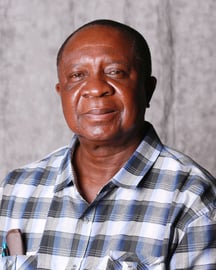- About
- Academics
- Admissions & Aid
- Life
- Research
- News & Events
Program at a Glance
The force that makes the universe work.
Department
Morehouse Physics majors are engaged in the interplay between matter, energy, and motion.
Learn More
Bachelor of Science in Physics
Learn More
In addition to completing the college’s general education requirements, a student pursuing a bachelor of science degree in physics must complete a program of study that consists of the following four components: introductory physics sequence, core physics courses, physics electives, and mathematics
requirements.
Physics Minor
Learn More
A minor in physics is available to the student who completes 18 hours of relevant coursework at Morehouse with no grade lower than C.
About the Physics Major
-
Overview
MOREHOUSE PHYSICS MAJORS ARE ENGAGED IN THE INTERPLAY BETWEEN MATTER, ENERGY, AND MOTION.
Our mission is to enhance our students’ intellectual skills through the rigorous study of physics. We offer a spectrum of courses that reflects both the integral character of physics in the liberal arts curriculum and its essential role in engineering and technology.
The program’s goals are to:
- Prepare physics majors for graduate study in physics and other professional careers
- Prepare dual-degree engineering program majors for matriculation at engineering schools
- Support the preparation of students majoring in biology, chemistry, computer science, and mathematics
- Assist other majors in satisfying the college’s general education requirements in science
Although the program plays a multipurpose role in the curriculum of the college, its primary objective is to prepare students for graduate study and ultimately successful careers in physics. The program also recognizes and accepts its responsibility to address the under-representation of African Americans in science and engineering. Historically, this has been and remains a foremost responsibility in our program. In this light, the program fosters in its students the ideals of ethical behavior and civic engagement, which are necessary for them to become leaders in the realm of science and engineering.
Outcomes
Physics majors should identify and understand the fundamental principles of classical and modern physics, and acquire the analytical and conceptual skills needed to apply these principles to the solution of problems of practical interest.
Students should develop an awareness of the implications of the role that scientific and technological advances play in contemporary society.
-
Earn the Major
BACHELOR OF SCIENCE IN PHYSICS
CURRICULUM
Major Course of Study Requirements
In addition to completing the college’s general education requirements, a student pursuing a bachelor of science degree in physics must complete a program of study that consists of the following four components: introductory physics sequence, core physics courses, physics electives, and mathematics
requirements.General Education (Core)
33-48 hoursRefer to the general education requirements for more information.
Physics Major
64 hoursIntroductory Physics Sequence (12 hours)
An introductory sequence of three elementary courses is offered for students who need preparation prior to beginning the core
physics courses.- HPHY 154—
Mechanics - HPHY 253—
- Electricity and Magnetism
- HPHY 254— Optics and Modern Physics
Core Physics Courses
18 hoursAll physics majors are required to take the following seven upper-level courses.
- HPHY 351— Junior Laboratory
- HPHY 353— Mathematical Physics I
- HPHY 360— Thermodynamics
- HPHY 361— Electromagnetic Theory
- HPHY 362— Classical Mechanics
- HPHY 363— Quantum Mechanics I
- HPHY 450— Senior Seminar
Mathematics Requirements
18 hoursAll physics majors are required to take the following five mathematics courses.
- HMTH 161— Calculus I
- HMTH 162— Calculus II
- HMTH 263— Calculus III
- HMTH 271— Introduction to Linear Algebra
- HMTH 321— Introduction to Ordinary Differential Equations
Note that each student pursuing a B.S. degree must complete a suitable introductory course from two science departments other than the department of his major. By taking HBIO 113— Comprehensive Biology and HCHE 111— Elementary Inorganic Chemistry, a student majoring in physics will satisfy the general education science requirement for the B.S. degree. Students can alternatively take higher-level courses in these disciplines.
Physics Electives
9 hoursAll physics majors are required to take three upper-level courses from one of the following seven categories.
Traditional Electives
- HPHY 354— Mathematical Physics II
- HPHY 364— Quantum Mechanics II
- HPHY 367— Advanced Optics
- HPHY 452— Senior Laboratory
- HPHY 460— Special Problems in Physics
- HPHY 470— Special Relativity
- HPHY 473— Nuclear and Particle Physics
- HPHY 474 Solid-State Physics
- HPHY 154—
-
Earn the Minor
PHYSICS MINOR
CURRICULUM
Although the college does not have a set of specific course requirements for a minor, a number of students find it beneficial to take additional courses beyond the introductory sequence in physics. A minor in physics is available to the student who completes 18 hours of relevant coursework at Morehouse with no grade lower than C. The selection of courses beyond the introductory physics sequence should be made in consultation with the student’s academic advisor and should take into consideration the student’s major, educational goals, and career goals.
MOREHOUSE PHYSICS MAJORS ARE ENGAGED IN THE INTERPLAY BETWEEN MATTER, ENERGY, AND MOTION.
Our mission is to enhance our students’ intellectual skills through the rigorous study of physics. We offer a spectrum of courses that reflects both the integral character of physics in the liberal arts curriculum and its essential role in engineering and technology.
The program’s goals are to:
- Prepare physics majors for graduate study in physics and other professional careers
- Prepare dual-degree engineering program majors for matriculation at engineering schools
- Support the preparation of students majoring in biology, chemistry, computer science, and mathematics
- Assist other majors in satisfying the college’s general education requirements in science
Although the program plays a multipurpose role in the curriculum of the college, its primary objective is to prepare students for graduate study and ultimately successful careers in physics. The program also recognizes and accepts its responsibility to address the under-representation of African Americans in science and engineering. Historically, this has been and remains a foremost responsibility in our program. In this light, the program fosters in its students the ideals of ethical behavior and civic engagement, which are necessary for them to become leaders in the realm of science and engineering.
Outcomes
Physics majors should identify and understand the fundamental principles of classical and modern physics, and acquire the analytical and conceptual skills needed to apply these principles to the solution of problems of practical interest.
Students should develop an awareness of the implications of the role that scientific and technological advances play in contemporary society.
BACHELOR OF SCIENCE IN PHYSICS
CURRICULUM
Major Course of Study Requirements
In addition to completing the college’s general education requirements, a student pursuing a bachelor of science degree in physics must complete a program of study that consists of the following four components: introductory physics sequence, core physics courses, physics electives, and mathematics
requirements.
General Education (Core)
33-48 hours
Refer to the general education requirements for more information.
Physics Major
64 hours
Introductory Physics Sequence (12 hours)
An introductory sequence of three elementary courses is offered for students who need preparation prior to beginning the core
physics courses.
- HPHY 154—
Mechanics - HPHY 253—
- Electricity and Magnetism
- HPHY 254— Optics and Modern Physics
Core Physics Courses
18 hours
All physics majors are required to take the following seven upper-level courses.
- HPHY 351— Junior Laboratory
- HPHY 353— Mathematical Physics I
- HPHY 360— Thermodynamics
- HPHY 361— Electromagnetic Theory
- HPHY 362— Classical Mechanics
- HPHY 363— Quantum Mechanics I
- HPHY 450— Senior Seminar
Mathematics Requirements
18 hours
All physics majors are required to take the following five mathematics courses.
- HMTH 161— Calculus I
- HMTH 162— Calculus II
- HMTH 263— Calculus III
- HMTH 271— Introduction to Linear Algebra
- HMTH 321— Introduction to Ordinary Differential Equations
Note that each student pursuing a B.S. degree must complete a suitable introductory course from two science departments other than the department of his major. By taking HBIO 113— Comprehensive Biology and HCHE 111— Elementary Inorganic Chemistry, a student majoring in physics will satisfy the general education science requirement for the B.S. degree. Students can alternatively take higher-level courses in these disciplines.
Physics Electives
9 hours
All physics majors are required to take three upper-level courses from one of the following seven categories.
Traditional Electives
- HPHY 354— Mathematical Physics II
- HPHY 364— Quantum Mechanics II
- HPHY 367— Advanced Optics
- HPHY 452— Senior Laboratory
- HPHY 460— Special Problems in Physics
- HPHY 470— Special Relativity
- HPHY 473— Nuclear and Particle Physics
- HPHY 474 Solid-State Physics
PHYSICS MINOR
CURRICULUM
Although the college does not have a set of specific course requirements for a minor, a number of students find it beneficial to take additional courses beyond the introductory sequence in physics. A minor in physics is available to the student who completes 18 hours of relevant coursework at Morehouse with no grade lower than C. The selection of courses beyond the introductory physics sequence should be made in consultation with the student’s academic advisor and should take into consideration the student’s major, educational goals, and career goals.
Concentrations
Our physics degree is available in six concentrations— astronomy, computational physics, interdisciplinary science (applied optics route), interdisciplinary science (biomedical physics route), physics education, and applications to society (law and politics route).
Astronomy
Concentration in Astronomy
- HPHY 470— Special Relativity
- ASTRO 3500— Quantitative Astronomy (offered at GSU)
- PHYS 3021— Stellar Astrophysics (offered at Georgia Tech)
Computational Physics
Concentration in Computational Physics
- HCSC 450— High-Performance Scientific Computing
- CSC 3510— Design and Analysis of Algorithms (offered at Georgia Tech)
- PHYS 3266— Computational Physics (offered at Georgia Tech)
Interdisciplinary Science (Applied Optics Route)
Concentration in Interdisciplinary Science (Applied Optics Route)
- PHY 367— Advanced Optics
- PHY 460— Special Problems in Physics (as Introduction to Lasers)
- PHYS 3223— Geometric Optics (offered at Georgia Tech)
Interdisciplinary Science (Biomedical Physics Route)
Concentration in Interdisciplinary Science (Biomedical Physics Route)
- HBIO 215/215L— Molecular Genetics
- BMED 3310— Biotransport (offered at Georgia Tech)
- PHYS 4251— Biophysics (offered at Georgia Tech)
Physics Education
Concentration in Physics Education
- SEDU 316— Exceptional Learners
- SEDU 444— Curriculum and Methods
- SEDU 458— Student Teaching
Applications to Society (Law and Politics Route)
Concentration in Applications to Society (Law and Politics Route)
- HPSC 348— American Constitutional Law
- HPSC 350— Race and the Law
- HPSC 371— Public Management
Meet Our Faculty and Staff
Dr. Wesley Sims, Department Chair

John Howard
Assistant Professor NTT

Dwayne Joseph
Assistant Professor

Emmanuel Karikari
Assistant Professor

Eddie C. Red
Associate Professor/Division Dean

Masilamani Sambandham
Associate Professor/Division Dean

Wesley Sims
Interim Department Chair, Physics/Assistant Professor
